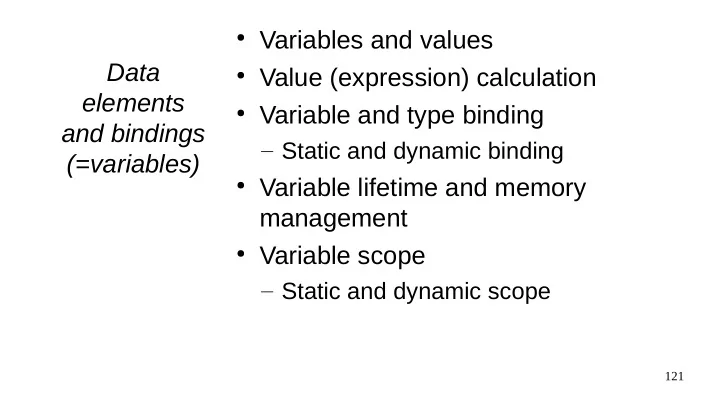

● Variables and values ● Value (expression) calculation Data elements ● Variable and type binding and bindings – Static and dynamic binding (=variables) ● Variable lifetime and memory management ● Variable scope – Static and dynamic scope 121
● Essential operations of the program – Memory location = place for data item Data – Content of the location = value of the data elements item ● pointer-/reference type (variables) • Value of a data item is a memory address or a reference to a memory location • In most languages identifies a variable (pointers equal → the same variable) ● In some languages "name" (of a variable) is a data element, in some, a reference to a data element (or both of them are possible) 122
● The following characteristics: – name (permanent or changeable) Variables – memory address (L-value) R: X <- X + 1; ("variable's identity") Scala: var X: Int = value; – value (R-value) – lifetime (memory management) – scope (visibility) Java: – type // ... ● aliasing void f(int i1, Integer i2) { – Several names refer i1 = i1 + i2; to same L-value i2 = i2 + i1; – (In C++ pointers also } // ... can cause aliasing) x.f(1, new Integer(2)); 123
● In some languages (C, C++, ...) variables contain the data ("value semantics") Value vs. ● In other languages (Java, Python, ....) variables reference (= names) are references to objects that semantics contain the data ("reference semantics") ● In value semantics, a name is permanently tied to a data item (whose value can change) ● In reference semantics, a name can be changed (rebound) to refer to another data ● Affects variable lifetime, memory allocation etc. ● A major source of confusion when changing to another language 124
● Variables: named data items ● (Usually also nameless variables Value semantics exist) ● Assigning to a variable changes the data ● Pointers/references: variables that refer to another variable p a 3 125
● Objects: nameless data items ● Variables/references/names (term Reference depends on language): named semantics references to objects ● (Usually also nameless references exist) ● Assigning to a variable changes the reference (refers now to another object) a ● Objects and variables separate, variables cannot refer to other variables, 3 only objects 126
● Changes the state of something L = R (or L := R , or L <- R ) Assignment ● L must be an L-value , and R must be a R-value ● Value semantics: Data element identified by L is changed to contain value of R ● Reference semantics: Name L is changed to refer to R instead of its original "value" ● Type checking: Make sure R is compatible with the type of L ● (In value semantics, L can usually also be a result of computation i.e., an expression) 127
● Variable bound to memory – Memory allocation and deallocation Lifetime ● Variable lifetime – Time during which a variable is bound to a specific memory location and its value is well-defined – Binding between data item and a memory location – Usually determined at compile time ● Exceptions such as persistent data in database ● Lifetime may be different from memory allocation – For local variables memory is often allocated at the beginning of function, even if initialization is later – E.g., C/C++ variable may be created to an already allocated memory location (placement new) 128
● Static variables – Bound before execution to a specific memory Variable location classification – Location is static throughout the execution – Global variables, C/C++ ”static” variables. based on – Amount of memory known at compile time (= lifetime and type has to be known, if not a reference) memory ● Stack-dynamic variables allocation – Binding happens when function is entered – Memory reserved from execution stack – Amount of memory known at compile time (= type has to be known, if not a reference) – C++ local variables, Java local basic type variables and references 129
● Explicit heap-dynamic variables – Binding to a specific memory location is done by Variable programmer's explicit request classification – Variable is accesses through pointer/reference – Variable has no name based on – Type is typically bound at compile time lifetime and – C++ new & delete, Java objects (new) memory – Sometimes automatic (Java autoboxing) ● Implicit heap-dynamic variables allocation – Binding happens upon assignment – Re-assignment causes a new binding and types may change – E.g., variables in most script languages (python etc) 130
Recommend
More recommend